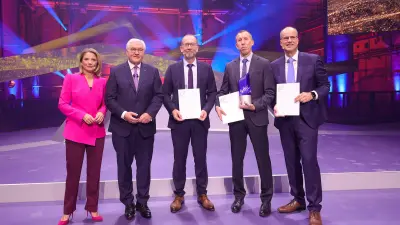Bosch team wins the Deutscher Zukunftspreis with fuel-cell power module
A research team from Bosch Research, together with a development team from Bosch Mobility, has received the Deutscher Zukunftspreis. The award supports the development of fuel cell technology, especially for heavy-duty transport.

For the development of the Fuel Cell Power Module (FCPM), led by Christoffer Uhr, Kai Weeber, and Pierre Andrieu, has now received the Deutscher Zukunftspreis 2025 in honor of this work. The German federal president’s award recognizes the system as a key technology for climate-neutral mobility. “This award is outstanding recognition for the entire team. It shows the innovative potential of hydrogen — and the decisive role that Bosch is playing in it,” says Dr. Stefan Hartung, chairman of the board of management of Robert Bosch GmbH.
The award-winning FCPM converts hydrogen and oxygen into electrical energy. This means commercial vehicles can cover long distances completely CO₂-free — provided they have green hydrogen in the tank. Their only remaining emission is water vapor. In this way, Bosch is playing a significant part in achieving climate neutrality in freight transport. Heavy trucks are responsible for more than one-quarter of CO₂ emissions from road traffic in the EU, but they are also indispensable for the transportation of goods and freight. “With the fuel-cell power module, Bosch has shown that hydrogen technology is suitable for large-scale production and can play a major part in decarbonizing road transport,” Hartung says. “This powertrain system combines engineering skill, experience, and systems expertise — and it marks an important step toward sustainable mobility.”
“The Future Prize is an outstanding recognition for our entire team and acknowledges the profound research work we have been investing in fuel cell technology at Bosch Research since 2014. This fundamental work is crucial to bring such complex systems to series production together with the Bosch Mobility division. In doing so, we are advancing the entire hydrogen value chain,” said Dr. Udo-Martin Gómez, Chairman of the Executive Board of the Central Research and Advanced Engineering division at Robert Bosch GmbH.
Kai Weber, Head of the Chemical Energy Converters portfolio at Bosch Research, explained: “As a researcher, I am convinced that innovation requires time, patience, and especially people who believe in visions. I am exceptionally grateful that my team and I at Bosch Research find an environment that allows us to hold on to promising ideas despite initial challenges and to develop them to series production readiness at the appropriate time.”
Several thousand trucks worldwide are equipped with the Bosch system
Large-scale production of the FCPM started in 2023 at the Stuttgart-Feuerbach plant, and shortly afterward also in Chongqing, China. With more than a thousand individual parts, the FCPM is one of the most complex systems in Bosch’s almost 140-year history – and at the same time one of the most pioneering. From the stack to the recirculation pump and the air compressor, all key components come from in-house research, development and manufacturing. The powertrain module itself can be installed in trucks where the combustion engine was previously located. Instead of diesel tanks, the trucks feature pressurized tanks for the hydrogen. Refueling times are comparable at around 15 minutes. Depending on the vehicle layout, and when driven economically, it is possible to cover up to 1,000 kilometers on a single tank of around 70 kilograms of hydrogen.
Today already several thousand trucks worldwide are on the road with the Bosch FCPM. The modules already out in the field are generating valuable development data: many systems exist both physically in the vehicle and as a digital twin in virtual space. Parameters such as temperature, pressure, and wear can be continuously monitored and incorporated directly into development work on the next generation of the powertrain system. FCPM technology can be used not only in trucks but also in bus powertrains and maritime propulsion systems. What’s more, it can provide decentralized CO₂-free electricity to data centers. Bosch Research also conducts research on PEM electrolysis stacks (PEM = proton exchange membrane), which operate on the reverse principle, producing hydrogen from water and electricity — another important building block in the hydrogen value chain. Following the market entry of its electrolysis stacks in April, the company recently put an electrolyzer with its own electrolysis technology for the first time at its Bamberg site.
The Deutscher Zukunftspreis
Since 1997, the Federal President has awarded the Deutscher Zukunftspreis annually to individuals or groups for outstanding technical, engineering, or scientific innovation. The award is aimed at researchers whose innovative projects and inventions have the potential to sustainably improve people's everyday lives and address societal challenges. In addition to the prestigious award, the honored individuals or teams receive prize money of 250,000 euros, which is intended to further support their research activities.
Bosch and the Deutscher Zukunftspreis
Bosch was nominated five times for the Deutscher Zukunftspreis between 1998 and 2013, and teams from Bosch or with Bosch involvement received the award three times: in 2005 for piezo injectors, in 2008 for smart sensors, and in 2013 for ultrashort pulse lasers. With the Deutscher Zukunftspreis 2025 for the fuel-cell power module, Bosch has written another page in this ongoing success story. The award demonstrates not only the company’s technological strength but also its vision for the future: a world in which hydrogen and fuel cells decisively contribute to the decarbonization of transportation.